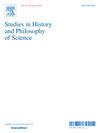William Herschel's defense of speculative inquiry
IF 1.8
2区 哲学
Q1 HISTORY & PHILOSOPHY OF SCIENCE
引用次数: 0
Abstract
Although William Herschel (1738–1822) is most well-known as an astronomer and instrument-maker, he also had interests in speculative philosophy (e.g., metaphysics), as several papers he read at the Bath Philosophical Society reveal. These papers, arguably, are the context in which Herschel engaged most directly in philosophical argumentation and are thus worthy of greater scholarly attention. In this article, I focus on Herschel's paper entitled “On the Utility of Speculative Inquiries,” in which he debates the legitimacy of speculation with an unnamed interlocutor, referred to as the “Gentleman.” In section 1, I briefly discuss Herschel's intellectual background. In section 2, I review some of the main points of contention between Herschel and the Gentleman. In section 3, I situate their dispute within a broader intellectual context by reference to the distinction between “experimental philosophy” and “speculative philosophy” (ESD). In section 4, I discuss the possible identity of the Gentleman, favoring the itinerant teacher of experimental philosophy John Arden over the more well-known Joseph Priestley. In section 5, I argue for the historical significance of this exchange, specifically that Herschel's debate provides support for the superiority of the ESD as a historiographical framework over the more familiar rationalism vs. empiricism distinction (RED). In section 6, I examine three further arguments Herschel provides to defend speculative inquiry. I conclude in section 7 by connecting Herschel's arguments to contemporary debates in general philosophy of science on the role that speculation plays in advancing scientific progress.
威廉·赫歇尔对思辨研究的辩护
虽然威廉·赫歇尔(William Herschel, 1738-1822)最为人所知的身份是天文学家和仪器制造商,但正如他在巴斯哲学学会读到的几篇论文所揭示的那样,他也对思辨哲学(如形而上学)感兴趣。可以说,这些论文是赫歇尔最直接参与哲学论证的背景,因此值得更多的学术关注。在这篇文章中,我将重点关注赫歇尔的论文《论投机探究的效用》,在这篇论文中,他与一位被称为“绅士”的匿名对话者讨论了投机的合法性。在第一节中,我简要地讨论了赫歇尔的知识背景。在第二节中,我回顾了赫歇尔和绅士之间争论的一些主要观点。在第3节中,我通过参考“实验哲学”和“思辨哲学”(ESD)之间的区别,将他们的争论置于更广泛的知识背景中。在第四部分,我讨论了绅士可能的身份,倾向于实验哲学的流动教师约翰·阿登,而不是更知名的约瑟夫·普里斯特利。在第5节中,我论证了这种交流的历史意义,特别是赫歇尔的辩论为ESD作为一种史学框架的优越性提供了支持,而不是我们更熟悉的理性主义与经验主义的区别(RED)。在第6节中,我进一步研究了赫歇尔为捍卫思辨探究而提供的三个论点。在第7节中,我将赫歇尔的论点与当代关于思辨在推动科学进步中所起作用的一般科学哲学的辩论联系起来。
本文章由计算机程序翻译,如有差异,请以英文原文为准。
求助全文
约1分钟内获得全文
求助全文
来源期刊

Studies in History and Philosophy of Science
管理科学-科学史与科学哲学
CiteScore
2.50
自引率
10.00%
发文量
166
审稿时长
6.6 weeks
期刊介绍:
Studies in History and Philosophy of Science is devoted to the integrated study of the history, philosophy and sociology of the sciences. The editors encourage contributions both in the long-established areas of the history of the sciences and the philosophy of the sciences and in the topical areas of historiography of the sciences, the sciences in relation to gender, culture and society and the sciences in relation to arts. The Journal is international in scope and content and publishes papers from a wide range of countries and cultural traditions.
 求助内容:
求助内容: 应助结果提醒方式:
应助结果提醒方式:


